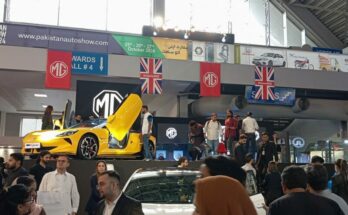In the face of mounting economic pressure and inflation, professionals in the automotive industry have united to present a number of strong recommendations aimed at propelling the sector forward. Their main demand is that the government offer a clear strategy and road map for navigating these challenging times.
A strong address on this topic was given during the Pakistan 2023 Auto Show symposium entitled “The Future Drive: Innovation, Exports, Trends, and Way Forward for Auto Parts Manufacturers,” hosted at the Expo Centre in Karachi.
Related: 150 Companies to Participate in the 2023 Pakistan Auto Show (PAPS)
Imtiaz Rastgar, a Manufacturing and Export Specialist, emphasized the need for Pakistani vendors to tap into the global market. He listed numerous prospects, including those related to gearboxes, steering wheels, hydraulic pumps, pistons, gearboxes, orthopedic implants, and hardware.
Diversification into unrelated products, services, and markets is the key to the future for auto parts manufacturers, according to Aamir Allawala, CEO of Technopack Telecom and former chairman of PAAPAM. Auto parts manufacturers currently grapple with challenges such as cost and price pressures from Original Equipment Manufacturers (OEMs), diminishing profitability due to cost inflation, and a surge in input costs. Aamir emphasized that, in these difficult times, collaborative partnerships with China should be investigated as a feasible option.
Veteran auto expert Mashood Khan emphasized the government’s responsibility in increasing exports of engineering items. In order to encourage sustainable growth, he argued for a distinct and long-term vision that would last at least 25 years. Khan thinks that adopting electric cars (EVs) is the right course of action and that Pakistan has a great chance to lead the world in EV charger production. He emphasized how important it is for the government to support programs that are in line with what the world’s markets and upcoming technology will require.
Related: PAAPAM Urges Tax Cuts to Boost Local Manufacturing
Ali Khizer, an economist and financial analyst, clarified how the industry’s reliance on imported raw materials lowers its competitiveness. The sector’s growth is hampered by the lack of critical mass and economies of scale. Khizer emphasized the need for structural reform and cited the historical pattern of car slowdowns during periods of balance of payments crisis.
The proposal put out by Dr. Aadil Nakhoda, an Assistant Professor and Research Fellow at IBA, aims to empower Small and Medium-Sized Enterprises (SMEs) by means of improving trade policies, developing clusters, streamlining trade procedures, and improving technical capacities.
The revolutionary influence of electric and autonomous vehicles on the automobile industry was explored by Tariq Khan, Senior Director of Corporate Strategy and Regulatory Affairs of Indus Motor Company. In order to determine the future of the sector, he asked for government backing and encouraged the discovery of markets like Saudi Arabia.
Related: Import Quotas for New Auto Companies Opened
The government’s viewpoint on the auto industry was highlighted by Asim Ayaz, General Manager Policy at the Engineering Development Board (EDB), who emphasized the introduction of new technologies, the participation of fresh players in tractor manufacturing, the development of hybrid and electric vehicles, and export necessities.
The government and industry professionals are working together to create a collaborative environment that will enable innovation, diversity, and sustainable growth in Pakistan’s auto sector going forward.
Source: Tribune

Responsible for delivering local & international automotive news.




